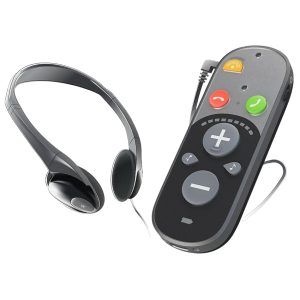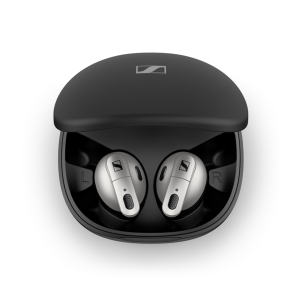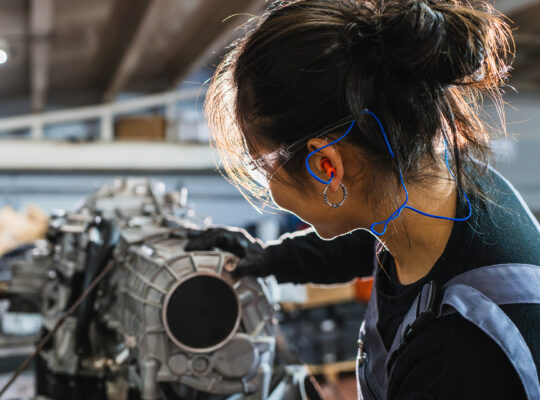You may have heard of it before: a hearing amplifier. Not to be confused with a hearing aid, although they are similar in how they work. But what exactly is it? Who is it intended for? And what can you expect from it?
In this blog we explain how hearing amplifiers work, when they are useful, what the differences are with hearing aids and what to look out for when considering one. No technical stuff, just clear information so you know where you stand.
What is a hearing amplifier?
A hearing amplifier is a small electronic device that amplifies environmental sounds. It picks up sound with a microphone, makes it louder through an amplifier and then sends the amplified sound into your ear through a small speaker.
You can think of it as a kind of magnifying glass for your hearing. It makes all the sounds in your environment stronger, so you can hear them better. And that can be quite handy in some situations.
Hearing amplifiers are often available as:
- A separate box of earbuds (similar to an old-fashioned walkman)
- An earpiece or headset with a built-in microphone
- A discreet in-ear solution
- A device you wear around your neck with a wireless connection to your ears
They are usually available without an audiological examination. You can just buy and use them, without an appointment at the audiologist or reimbursement through health insurance.
How is it different from a hearing aid?
This is perhaps the most frequently asked question. And the answer is quite simple:
- Hearing aids are medical devices, specially tailored to your hearing loss, often after a hearing test at an audiologist or ENT doctor’s office. They filter noise, muffle loud sounds, amplify certain frequencies and can even memorize multiple listening profiles.
- Hearing amplifiers are consumer products, intended for occasional use or as simple support for mild hearing loss. They are not custom-made and amplify sound “simply” linearly. Everything gets louder, indiscriminately.
So where hearing aids are selective and smart, hearing amplifiers are mostly simple and fast. But that may also be exactly what you’re looking for.
For whom is a hearing amplifier useful?
A hearing amplifier is not the perfect solution for everyone, but in some cases it comes in handy. Consider:
- People who are still unsure about a hearing aid and want to try something out
- Situations where you need temporary reinforcement (e.g., in a busy restaurant or meeting)
- People with limited hearing loss who need that little bit extra
- Elders who don’t want to get used to complicated technology
- As a backup when your hearing aids malfunction
- For family caregivers or family members who find that conversations are no longer coming through properly
They can also come in handy as a temporary solution to ear problems such as an ear infection, blocked ear canal or temporary hearing loss after a cold.
How does it work technically?
The basics are simple. A hearing amplifier usually consists of four parts:
- Microphone – captures ambient noise
- Amplifier – makes the sound louder
- Speaker (speaker) – brings the sound to your ear
- Battery or accumulator – provides power
Some models also have additional features such as:
- Adjustable volume
- Different listening modes (e.g., for music, speech or outdoor use)
- Noise reduction
- Directional microphones that focus on what’s happening in front of you
Note that these are not medical settings. You set them yourself based on what sounds comfortable. This is convenient, but also limiting.
Are there any drawbacks?
Sure. A hearing amplifier sounds like a panacea, but it also has limitations:
- Everything gets louder: including noise, murmurs or disturbing background noise
- No adaptation to your hearing loss: so certain tones may still not be easily heard
- Can cause hearing damage if used incorrectly (too loud volume!)
- Not suitable for severe hearing loss
- No reimbursement from health insurance
Think of it as glasses from HEMA: fine if you’ve lost your reading glasses, but not meant to replace custom-made glasses from the optician.
So when do you choose an ear amplifier?
If you:
- Have not yet had an official hearing test, but have difficulty understanding
- Don’t want a hearing aid right away, but want to experiment
- Seeking a temporary, supplemental or replacement solution
- Unable or unwilling to apply for reimbursement
- Just looking for a simple solution to specific situations
Then a hearing amplifier is worth trying.
Extra tip: always keep one as a backup
Even if you have a hearing aid, it is helpful to have a hearing amplifier in your home. For example:
- In case of malfunction or maintenance of your hearing aids
- During vacations or camping
- As a temporary replacement for earplug or battery problems
- Or for emergencies, when you cannot function safely without your hearing aid
Also useful for partners or family members who don’t yet take your hearing problems so seriously: put one on and let them experience how big a difference it makes.
Hearing amplifiers at Horend Goed
In our webshop you will find a wide range of hearing amplifiers, including these popular models:
Good to start with
Some people first try a hearing amplifier, but later want something that really works for them. Then you soon end up with a professional hearing aid, tailored to your audiogram.
Whatever you choose: make sure your ears are getting what they need. And take hearing problems seriously. Your hearing is a sense you use every day – so grant it a tool that’s right for you.
Having doubts? Let us know. We are happy to think with you – with or without reinforcement.










